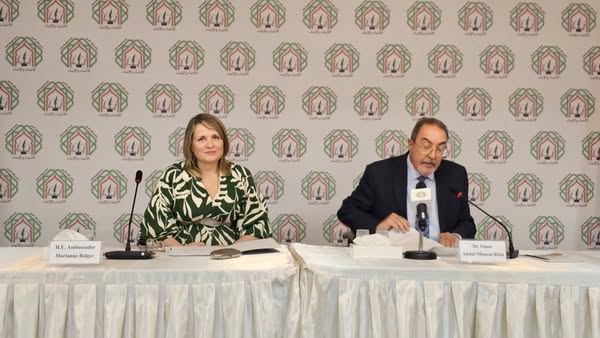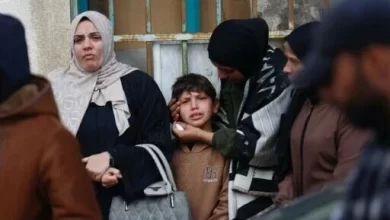
By : Nedal Zubeidi
Jordan Daily – Ireland’s experience in achieving peace in Northern Ireland offers valuable lessons for global conflict resolution, Irish Ambassador Marianne Bolger to Jordan said Wednesday at a colloquium hosted by the Arab Thought Forum in Amman.
Speaking on “Reflections on the Peace in Northern Ireland,” Bolger highlighted the 1998 Good Friday Agreement as a “seminal step in ending the cycle of violence” that plagued Northern Ireland for nearly three decades. The agreement, signed after years of negotiations and multiple prior failed attempts, was widely described at the time as a “diplomatic miracle.”
Opening with a line from W.B. Yeats’ poem Remorse for Intemperate Speech, Bolger quoted: “Out of Ireland have we come. Great hatred, little room, Maimed us at the start,” adding that “despite the little room, we found a space for compromise – possibly the most important lesson of them all.”
The ambassador gave during the symposium moderated by Dr. Omar Abdul-Monem Rifai a concise historical overview, noting the deep-rooted political and sectarian divisions stemming from the partition of Ireland in 1921. The “Troubles,” which erupted in 1969, claimed over 3,700 lives and persisted until the peace agreement in 1998.
The Good Friday Agreement, Bolger said, was the result of joint efforts by the Irish and British Governments, international actors, and civil society. “It offered a fresh start to a society divided by violence,” she said, though cautioning that “it has not always been an easy or straightforward journey.”
Bolger noted that while the agreement created new political institutions based on power-sharing, the process remains fragile. “The structure is imperfect,” she said, referencing the repeated suspensions of Northern Ireland’s devolved government.
Key lessons from the peace process included inclusive dialogue, international mediation, security reform, and transitional justice. “There will be no cherry-picking of the Agreement,” she recalled from the time, stressing the importance of implementation.
Among the most powerful themes was the role of women. Bolger credited the Northern Ireland Women’s Coalition for its cross-community approach and influence in the talks. “They were advocates for the inclusion of Sinn Féin and loyalist parties,” she said, noting the Coalition’s core principles of “inclusion, equality and human rights.”
She also praised the late British Secretary of State for Northern Ireland, Mo Mowlam, for her hands-on role during the talks, quoting her as saying: “What is important is to believe and be determined […] to show the determination, courage and confidence that we can do it.”
Bolger emphasized the long-term international engagement required to support peace, including bipartisan U.S. political support and continued EU involvement, especially during and after Brexit. The economic dividend of peace was also significant, with cross-border trade and tourism flourishing.
Turning to Ireland’s foreign policy, Bolger noted that the country’s history of colonisation, famine, and migration has informed its values of “empathy, partnership and independence.” These guide its international engagements, including in the Middle East.
Ireland has been a strong advocate for Palestinian rights. “Our involvement in the peace process in Northern Ireland has shaped our viewpoints – to have strong support for those who suffer oppression,” Bolger said, referencing Ireland’s recognition of the State of Palestine in May and €26 million in aid this year.
The Ambassador highlighted youth and education-focused projects supported by the Irish Embassy in Jordan, including scholarships, mental health initiatives, and cross-border exchanges. “If given enough space and opportunity, young people can build stability and reconciliation into the future,” she said.
Concluding, Bolger challenged prevailing pessimism about the Israeli-Palestinian conflict: “If we believe this to be true, that Palestinians will never have a right to statehood, are we then condemning these people to continuous cycles of enduring the worst and unimaginable cruelties and injustice that humans can be subjected to?”

